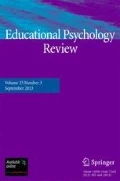Abstract
Over the past half century, much has been learned about the ways in which students develop and learn. Unfortunately, this knowledge often does not find its way into the classroom. Teachers can begin to use this knowledge by focusing on a few key ideas. They need to go beyond the presentation of content to helping students acquire strategies for processing that content. They need to achieve a balance between knowledge and process (rather than choose one or the other). They need to minimize teaching content in isolation, choosing instead to contextualize the content in real-life experiences and applications. Finally, they need to help students learn to make informed, defensible decisions on their own. Changes in curriculum, both at the macro- and micro-levels can assist teachers in making these changes in their teaching.
Similar content being viewed by others
References
Anderson, L. W., Krathwohl, D. R., Airasian, P. W., Cruikshank, K. A., Mayer, R. E., Pintrich, P. R., Raths, J., & Wittrock, M. C. (2001). A taxonomy for learning, teaching, and assessing: A revision of Bloom’s taxonomy of educational objectives. New York: Longman.
Berry, B. (2010). Teacher education for tomorrow. Hillsborough: Center for Teaching Quality.
Bloom, B. S. (1968). Learning for mastery. Evaluation Comment, 1(2), 1–12.
Boekaerts, M., Pintrich, P. R., & Zeidner, M. (Eds.). (2000). Handbook of self-regulation. San Diego: Academic Press.
Brophy, J., & Alleman, J. (2003). Social studies excursions, K-3, book one: Powerful units on food, clothing, and shelter. Portsmouth: Heinemann.
California State Board of Education (2000). Science standards for California public schools. Sacramento, CA: Author.
Campos, M. R. (2005). Passive bystander or active participant: The dilemmas and social responsibilities of teachers, PRELAC Journal, 1, 1–193. Available online at http://unesdoc.unesco.org/images/0014/001446/144666e.pdf.
Darling-Hammond, L., Bransford, J., LePage, P., Hammerness, K., & Duffy, H. (Eds.). (2005). Preparing teachers for a changing world: What teachers should learn and be able to do. San Francisco: Jossey-Bass.
Daro, P., Mosher, F., & Corcoran, T. (2011). Learning trajectories in mathematics: A foundation for standards, curriculum, assessment, and instruction. Philadelphia: Consortium for Policy Research in Education. Available online at http://www.cpre.org/ccii/images/stories/ccii_pdfs/learning%20trajectories%20in%20math_ccii%20report.pdf.
DeFranco, T. C., & Curcio, F. R. (1997). A division problem with a remainder embedded across two contexts: Children’s solutions in restrictive versus real-world settings. Focus on Learning Problems in Mathematics, 19(2), 58–72.
Ennis, R. H. (1996). Critical thinking. Upper Saddle River: Prentice-Hall.
Fullan, M. J. (2001). New meaning of educational change (3rd ed.). New York: Teachers College Press.
Heritage, M. (2008). Learning progressions: Supporting instruction and formative assessment. Washington: Council of Chief State School Officers.
Hinde, E. R. (2004). School culture and change: An examination of the effects of school culture on the process of change. Essays in Education, 12 (entire). Available online at http://www.usca.edu/essays/vol122004/hinde.pdf.
Hirsch, Ed. Jr. (Ed.) (2007). What your sixth grader needs to know: Fundamentals of a good sixth-grade education. New York: Doubleday.
Pogrow, S. (1990). Challenging at-risk students: Findings from the HOTS program. Phi Delta Kappan, 71, 389–397.
Porter, A. C. (2006). Curriculum assessment. In J. L. Green, G. Camilli, & P. B. Elmore (Eds.), Handbook of complementary methods in education research (pp. 141–159). Washington: American Educational Research Association.
Shimabukoro, J. (2010). For educational change – teachers are the key. Educational Technology and Change. Retrieved September 22, 2010, from http://etcjournal.com/2010/07/28/for-educational-change-teachers-are-the-key/.
Weinstein, C. (1989). Teacher education students’ preconceptions of teaching. Journal of Teacher Education, 40, 53–60.
Author information
Authors and Affiliations
Corresponding author
Rights and permissions
About this article
Cite this article
Anderson, L.W. What Every Teacher Should Know: Reflections on “Educating the Developing Mind”. Educ Psychol Rev 24, 13–18 (2012). https://doi.org/10.1007/s10648-011-9189-0
Published:
Issue Date:
DOI: https://doi.org/10.1007/s10648-011-9189-0




